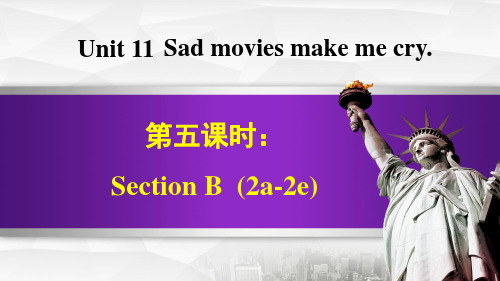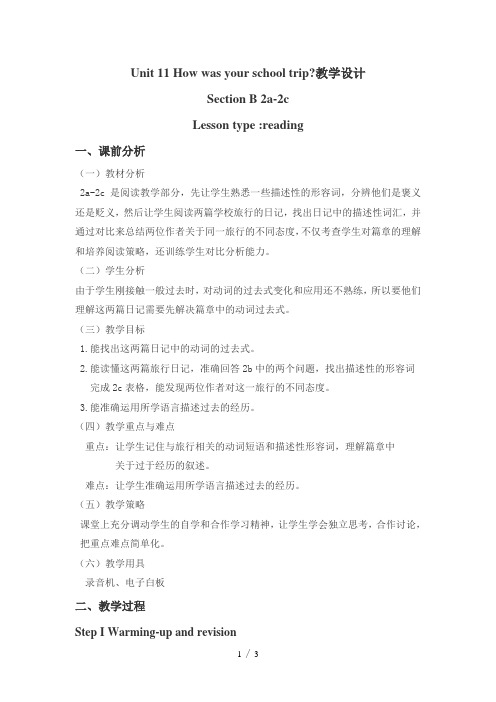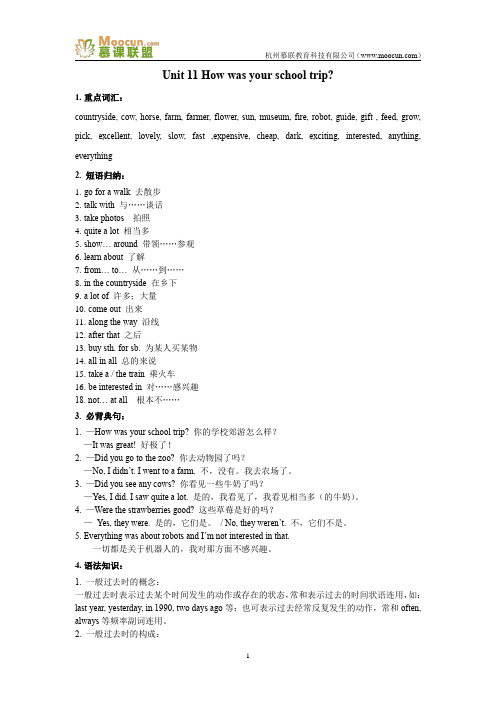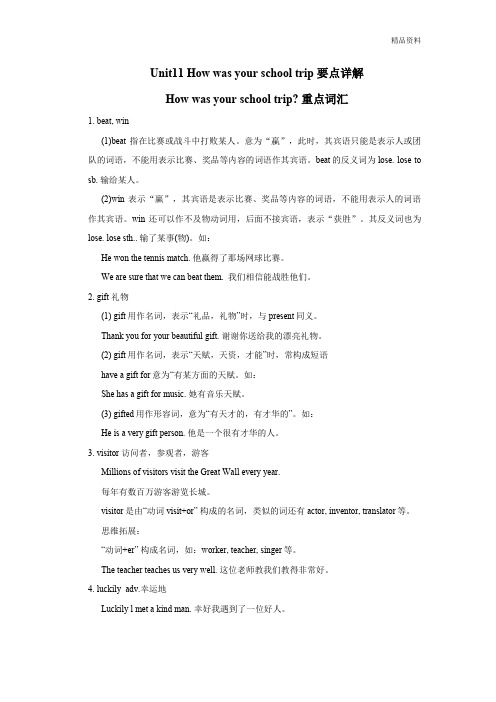下学期unit 11 reading
2021春人教版九年级英语下册 Unit 11 Unit 11 SectionB (2a-2e)

the school soccer field.
考点3 stop doing sth. 停止做某事 e.g. When he saw me, he stopped working. 当他看到我时他停止了工作。
考向 辨析:alone 与lonely
alone
作adj. 指客观上独自一人。 作adv. 常修饰动词或动词短语。
lonely
作adj. 指情感上的孤独。固定搭配 feel lonely 感到孤独。
e.g. My parents went to work so I was alone at home. 我父母去上班了,因此我独自一人在家。 He enjoys working alone. 他喜欢独自工作。 No one played with him and he felt lonely. 没有人和他玩,他感到孤独。
4. What happened after Peter told his teammates that he was sorry? To his surprise and relief, his teammates all nodded in agreement.
5. Why did Peter think that he was on a winning team even though they lost the last game? Because his teammates said, “Don't worry about it. It's never just one person’s fault. We should think about how we can do better next time.”
Unit 11阅读提升训练 人教版七年级下册

初一英语思维拓展班(Unit 11专练)班级:姓名:日期:月号Unit 11 How was your school trip?请阅读下面短文,根据语篇内容,在方框内的缩写文章中,填入与短文意思最符合的单词,并将答案写在相应的位置上。
每空一词。
阅读填词On February 22nd, 2022, it was snowy in Yongzhou, Hunan. Zou Wanting, a student from a high school, was going back home from school at about 10 pm. She saw a fallen tree (倒下的树) near a bus station. Then she started to move (搬) the tree. But it was not an easy thing for her.It was lucky that a man joined her and helped her move the tree away. Then Zou went home. She thought it was a little thing. But a video of her moving the tree got popular on the Internet. Many people knew the girl from the video.“I wanted to move the tree because I wished other people to go home early,” Zou said. On February 28th, she got an award (奖金) 一5,000 yuan from Alibaba. She said, “I’m a lucky girl. I will use the money for my study.”At Zou’s school, she has many friends and she often helps her classmates. One of her classmates said, “Every student knows her now. She did a great thing and our teacher asked us to learn from her.”1. 2. 3.5.非连续性文本阅读请阅读下面非连续性文本,根据语篇内容,回答问题,并将答案写在相应的位置上。
人教版英语九年级Unit 11同步阅读(含答案)

新目标英语九年级Unit 11同步阅读(含答案)Unit 11 Could you please tell me where the restrooms are?1选择适合的词语完成下面的短文。
When you speak, write a letter or make a telephone call, your words ___1___ a message. People municate with words. Do you think you can municate ___2___ words? A smile on your face shows you are happy and friendly. Tears in your eyes tell ___3___ that you are sad. When you ___4___ your hand in class, the teacher knows you want to say something of ask questions. You shake your head, and people know you are saying “no”. You nod and people know you are saying “___5___”.Other things can also carry message. For example, a sign at the bus stop helps you to know which bus ___6___. A sign on the wall of your school helps you to find the library. Signs on doors tell you ___7___ to go in or out. Have you ever noticed that there are a lot of signs around you and that you receive messages from them all the time? People can municate ___8___ many other ways. An artist can use his drawings to tell about beautiful mountains, about the blue sea and many other things. Books ___9___ to tell you about all wonderful things in the world and also about people and their ideas. Books, magazines, TV and radio and films all help us to municate with other people. They all help us to know ___10___ is going on in the world.( ) 1. A. take B. bring C. carry D. gives( ) 2. A. by B. with C. use D. without( ) 3. A. others B. the others C. other D. the other( ) 4. A. put on B. put out C. put up D. put down( ) 5. A. no B. hello C. yes D. nothing( ) 6. A. to get B. to choose C. to have D. to take( ) 7. A. which B. where C. how D. what( ) 8. A. with B. by C. without D. in( ) 9. A. write B. wrote C. is written D. are written( ) 10. A. what B. which C. that D. who2根据短文内容选择最佳答案。
人教版七年级英语下册Unit11全章课件

针对练习 ( A ) 1.Don't
A.feed C.follow
the animals when visiting them. B.forget D.fight
2.anything的用法 anything为复合不定代词,意为“某事;某东西”时,用于疑问句; 意为“任何东西;任何事物”时,用于肯定句;意为“任何事物 都(没有)”时,用于否定句。 ·Do you want anything from me? 你想从我这里要什么东西吗? ·You can ask me anything you want to know. 你可以问我你想知道的任何事。 ·We can't believe anything he says. 无论他说什么,我们都不能相信。
B.It was boring
C.I didn't like it
D.The weather was cloudy
二、根据句意,用括号中所给词的适当形式填空。 6.I went to Guilin last summer vacation.It was excellent .(excellently) 7.My grandfather can't see anything because of his sick(生病的)
课后提升
一、单项填空。
( D )1.He told me he
a book at that time.
A.reads
B.is reading
C.was read
D.was reading
( A ) 2.She's very worried
her brother.
A.about
B.of
人教英语七年级下册Unit 11 晨读本和晨读听写

Unit 11How was your school trip?Section A重点单词➢朗读下列单词1. *milk/mɪlk/ v.挤奶2. *cow/kaʊ/ n.奶牛3. *horse/hɔ:(r)s/n.马4. feed/fi:d/v. (fed /fed/ )喂养;饲养5. farmer/'fɑ:(r)mə(r)/n.农民;农场主6. quite/kwaɪt/ adv.相当;完全7. anything /'enɪθɪŋ/p ron. 任何东西;任何事物8. grow /rəʊ/ v. (grew /ru:/)种植;生长;发育9. farm/fɑ:(r)m/n.农场; v.务农;种田10. pick/pɪk/v.采;摘11. excellent/'eksələnt/ adj.极好的;优秀的12. *countryside/'kʌntrisaɪd/n.乡村;农村13. yesterday/'jestə(r)di/ adv.昨天14. *flower/'flaʊə(r)/n.花15. worry/'wʌri/, /'wɜ:ri/v.&n.担心;担忧16. luckily /'lʌkɪli/adv.幸运地;好运地17. sun/sʌn/n.太阳➢朗读下列单词变形1. come—came(过去式)2. get—got(过去式)3. do—did(过去式)4. grow—grew(过去式)5. eat—ate(过去式)6. feed—fed(过去式)7. ride—rode(过去式)8. farm—farmer /farming(名词)9. is /am—was(过去式)10. worry—worried(过去式)11. take—took(过去式)12. see—saw(过去式)13. have—had(过去式)14. buy—bought(过去式)15. go—went(过去式)16. lucky(形容词)—luckily(副词)—luck(名词)17. are—were(过去式)18. pick—picked(过去式)重点短语➢朗读下列短语1. milk a cow给奶牛挤奶2. in the countryside在乡下;在农村3. ride a horse骑马4. talk with sb.和某人交谈5. ask sb. questions问某人问题6. grow apples种植苹果7. from…to… 从…到…8. visit sb.看望某人=see sb.9. eat /have one's lunch吃某人的午饭10. come out (太阳、月亮或星星)出现11. quite a lot (of…)许多= quite a few12. go for a walk去散步=take a walk13. feed chickens喂鸡14. take photos /pictures拍照15. show sb. around…带领某人参观……16. learn…about…学习……有关……17. pick strawberries摘草莓18. go fishing去钓鱼19. under a tree 在树下重点句子➢朗读下列句子1. — 上周你的旅行怎么样?—棒极了。
人教版七年级英语下册unit11HowwasyourschooltripSectionB2a-2c教学设计

Unit 11 How was your school trip?教学设计Section B 2a-2cLesson type :reading一、课前分析(一)教材分析2a-2c是阅读教学部分,先让学生熟悉一些描述性的形容词,分辨他们是褒义还是贬义,然后让学生阅读两篇学校旅行的日记,找出日记中的描述性词汇,并通过对比来总结两位作者关于同一旅行的不同态度,不仅考查学生对篇章的理解和培养阅读策略,还训练学生对比分析能力。
(二)学生分析由于学生刚接触一般过去时,对动词的过去式变化和应用还不熟练,所以要他们理解这两篇日记需要先解决篇章中的动词过去式。
(三)教学目标1.能找出这两篇日记中的动词的过去式。
2.能读懂这两篇旅行日记,准确回答2b中的两个问题,找出描述性的形容词完成2c表格,能发现两位作者对这一旅行的不同态度。
3.能准确运用所学语言描述过去的经历。
(四)教学重点与难点重点:让学生记住与旅行相关的动词短语和描述性形容词,理解篇章中关于过于经历的叙述。
难点:让学生准确运用所学语言描述过去的经历。
(五)教学策略课堂上充分调动学生的自学和合作学习精神,让学生学会独立思考,合作讨论,把重点难点简单化。
(六)教学用具录音机、电子白板二、教学过程Step I Warming-up and revision1.Brain Storm (列举一些评价学校旅行的描述性形容词)good badplete 2aStep II Reading1.Pre-reading(1)Underline the past tense of the verbs in the diary entries.Like: went ...visited ...(2)Choose some of the words to describe what you did last Saturday or Sunday.Like: I went to the countryside last Saturday. I visited my aunt and ate lunch at her home. I played some games with my cousins. ......2.While-reading(1)Fast reading:Read the articles and find their styles(体裁),then answer the following question. When were the trips?(2)Careful reading:Read the two diary entries carefully and find their topic sentences(主题句),then answer the questions:①Did Helen and Jim go on the same trip?②How do they feel about the trip?(3)Whole reading:Read the two diary entries again ,find all the description words and complete the chart.3.Post-reading(1)Discuss the key phrases and sentences in groups.The teacher explains the difficultpoints.沿途 ________ 总之_______对......感兴趣 _________ 一点儿也不_______我不知道他们竟能和我们对弈。
人教版英语七年级下册单元Unit 11 知识点+测试卷+思维导图

Unit 11 How was your school trip?1.重点词汇:countryside, cow, horse, farm, farmer, flower, sun, museum, fire, robot, guide, gift , feed, grow, pick, excellent, lovely, slow, fast ,expensive, cheap, dark, exciting, interested, anything, everything2. 短语归纳:1.go for a walk 去散步2.talk with 与……谈话3.take photos 拍照4.quite a lot 相当多5.show… around 带领……参观6.learn about 了解7.from… to… 从……到……8.in the countryside 在乡下9.a lot of 许多;大量e out 出来11.along the way 沿线12.after that 之后13.buy sth. for sb. 为某人买某物14.all in all 总的来说15.take a / the train 乘火车16.be interested in 对……感兴趣18. not… at all 根本不……3. 必背典句:1. —How was your school trip? 你的学校郊游怎么样?—It was great! 好极了!2. —Did you go to the zoo? 你去动物园了吗?—No, I didn’t. I went to a farm. 不,没有。
我去农场了。
3. —Did you see any cows? 你看见一些牛奶了吗?—Yes, I did. I saw quite a lot. 是的,我看见了,我看见相当多(的牛奶)。
4. —Were the strawberries good? 这些草莓是好的吗?—Yes, they were. 是的,它们是。
2020年人教版七年级英语下册Unit11 How was your school trip 要点详解

Unit11 How was your school trip 要点详解How was your school trip? 重点词汇1. beat, win(1)beat指在比赛或战斗中打败某人。
意为“蠃”,此时,其宾语只能是表示人或团队的词语,不能用表示比赛、奖品等内容的词语作其宾语。
beat的反义词为lose. lose to sb. 输给某人。
(2)win表示“赢”,其宾语是表示比赛、奖品等内容的词语,不能用表示人的词语作其宾语。
win还可以作不及物动词用,后面不接宾语,表示“获胜”。
其反义词也为lose. lose sth.. 输了某事(物)。
如:He won the tennis match. 他赢得了那场网球比赛。
We are sure that we can beat them. 我们相信能战胜他们。
2. gift 礼物(1) gift用作名词,表示“礼品,礼物”时,与present同义。
Thank you for your beautiful gift. 谢谢你送给我的漂亮礼物。
(2) gift用作名词,表示“天赋,天资,才能”时,常构成短语have a gift for意为“有某方面的天赋。
如:She has a gift for music. 她有音乐天赋。
(3) gifted用作形容词,意为“有天才的,有才华的”。
如:He is a very gift person. 他是一个很有才华的人。
3. visitor 访问者,参观者,游客Millions of visitors visit the Great Wall every year.每年有数百万游客游览长城。
visitor是由“动词visit+or”构成的名词,类似的词还有actor, inventor, translator等。
思维拓展:“动词+er”构成名词,如:worker, teacher, singer等。
The teacher teaches us very well. 这位老师教我们教得非常好。
- 1、下载文档前请自行甄别文档内容的完整性,平台不提供额外的编辑、内容补充、找答案等附加服务。
- 2、"仅部分预览"的文档,不可在线预览部分如存在完整性等问题,可反馈申请退款(可完整预览的文档不适用该条件!)。
- 3、如文档侵犯您的权益,请联系客服反馈,我们会尽快为您处理(人工客服工作时间:9:00-18:30)。
1.what is a way for people to show who they are and what is in their heart? A. music B. blues C. pop music D. hip-hop 2. where did the blues come from? A. American songs B. Chinese music C. African songs D. British music
in common: 共用,共同的 e.g. I have nothing in common with Jane.
Mr and Mrs Smith own the store in common.
Can you enjoy music from other parts of the world even if you don’t understand the words?
2 ( F ) Blues is a new style of music. music has a long history. 3 ( F ) Hip-hop and rap are completely different They have much in common with blues & rock, from blues andalso rock. but they have their own characteristics.
eg: I heard the news on the radio.
Reading
Where does blues music come from?
The blues comes from African songs that people used to sing when they worked and during festivals.
What does the word "rap" mean?
The word “rap” means to speak the song words along with the beat .
Why is Latin music so popular in the US?
Because there are many Spanish-speaking people in the US.
2、Match the main idea and each paragraph.
Para 1
Para 2
Blues music has a long history. Latin music has spread all over the world. There is a wide variety of new music to be discovered in every corner of the world. There is a world of music out there. Today’s American culture contains many different musical styles.
Para 3
Para 4 Para 5
variety:(n.)number of different things. 种类 eg:Iron has a variety of uses.
various:(adj.)各种各样的 eg: For various resons,he didn`t go to school yesterday.
4 ( T ) Santana is a well-known Latin music artist. 5 ( F ) Rappers speak sing the words to their music. 6 ( T ) There are many Spanish-speaking people in both North and South America.
Read the passage and decide whether the following statements are true or false.
1 ( F ) There are a few styles of music isonly a wide variety in the world.
Unit 11
Group PrΒιβλιοθήκη sentationListening :
1、How many kinds of music are mentioned in the passage and what they are? Five .They`re Blues music,jazz,hip-hop,rap and Latin music.
3. what have much in common with blues and rock? A. classical music and pop music B. pop music and jazz C. rap and rock music D. hip-hop music and rap 4. what music has always been popular in Spanish-speaking countries? A. pop music B. Latin music C. American music D. hip-hop
Scanning Pare.1
What we hear on the radio or see on TV is all the music that is waiting for us. F
a small part of
on the radio = over the radio = by radio
